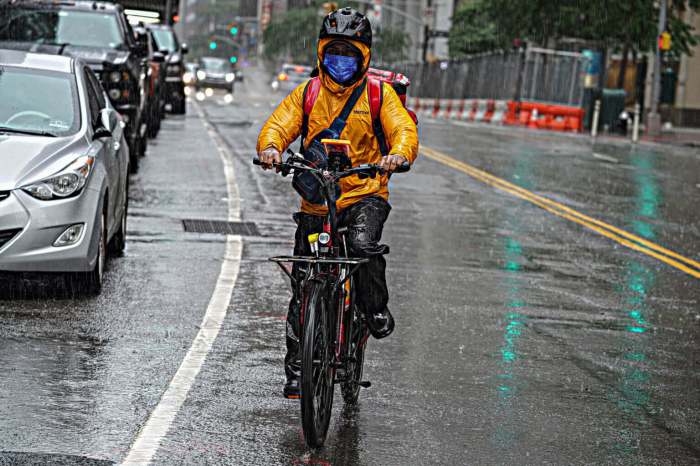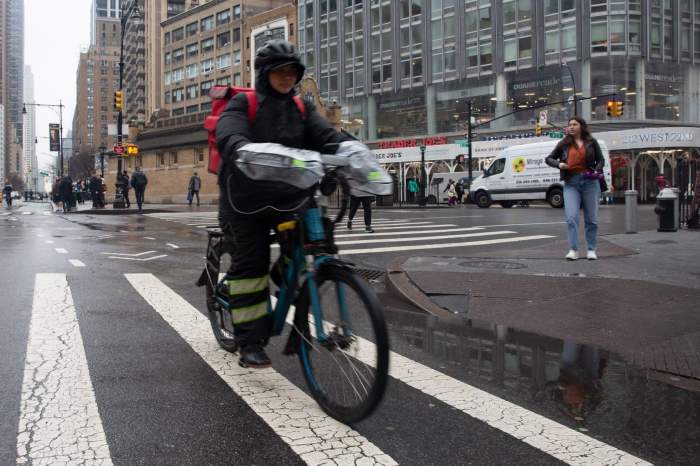The lasting impacts of the COVID-19 pandemic and more recent economic challenges have reshaped nearly every industry in New York City, but especially small businesses that were forced to consider how to adapt in order to survive what’s become a new normal. We are proud of how restaurants in particular have tapped into their creativity to develop new approaches to reach customers and also evolve and modernize their businesses.
As the city is now finalizing a new minimum pay rate for food delivery workers, it must account for the irreversible impacts that this could have on these restaurants that are beloved neighborhood institutions.
For many business owners, embracing delivery in recent years has become a way to accommodate shifting customer needs. Utilizing platforms like DoorDash and UberEats can provide an increasingly significant portion of their revenue because that’s where their customers are. Expanded food delivery options have strengthened the local economy and become a crucial element to the survival of many restaurants.
With this in mind, it’s clear that any sustained reduction to this critical revenue stream could be catastrophic. While the revised proposal released earlier this month acknowledges some of the very real consequences that would come with increasing the cost of delivery services, it is still poised to make these services unsustainable in the city for local businesses if not carefully addressed.
In the city’s revised proposal for the minimum pay rate, platforms have two options for how to pay delivery workers. One option requires operational changes to these platforms that would be widely unpopular among delivery workers. The other option is to pay delivery workers almost $30 per hour while delivering this year and rising to $33 per hour by 2025 — an unprecedented increase that would undoubtedly result in raising the cost of delivery services for consumers. Regardless of the option selected, restaurants, small businesses, workers, and New York City consumers lose.
The NYC Hispanic Chamber of Commerce represents thousands of Hispanic-owned small businesses across the five boroughs, many of which are family-owned businesses. However, many of our members would find themselves unable to navigate their already-thin margins amid these increased costs, especially those small businesses that are already struggling with additional challenges like inflation, supply chain issues, labor shortages and continued concerns about a recession.
The city originally estimated that its proposal would increase costs for consumers on each order by upwards of $5, logically leading to fewer orders being placed. So the rule would end up meaning far fewer orders for delivery workers – those that the city is trying to support in the first place – and widespread unintended consequences leaving many restaurants uncertain if they will be able to survive.
We are especially concerned about those in less-dense areas, which may not consistently have high delivery volume. If, as expected, these rules force platforms to adjust their operations, it’s likely they would need to restrict opportunities for delivery workers in certain areas to help cut down on costs, making it even harder for many restaurants to fulfill the orders they need to stay open. For many of our member restaurants located in Harlem, the Upper West Side, Washington Heights and the Bronx, this proposed rule could significantly impair their ability to offer delivery services at all.
These efforts are clearly well-intentioned to support delivery workers, who have long provided an important service to New York City. While we do not yet know the full impact of the proposed minimum pay rate, it’s almost assured that this proposal would lead to far-reaching negative impacts that would reverberate across the small business community — we ultimately may lose many of these businesses entirely.
It is clear that the city must take careful consideration before announcing a final ruling on this minimum pay rate. We implore the city to come up with a solution that recognizes the work that delivery workers do, while ensuring our small businesses aren’t left to deal with the collateral damage.




































